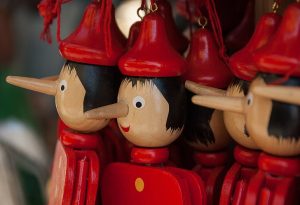
“And they told him, saying ‘Yosef is still alive. He is the ruler of all Egypt’ and his heart became numb, for he did not believe them” (45:26)
The verse states that when the brothers revealed to Yaakov that Yosef was still alive, he did not believe them. The Midrash comments that “such is the fate of the liar – even when conveying the truth he is not believed”.1 Since they had lied to Yaakov earlier concerning Yosef’s fate, Yaakov refused to believe them this time. When Delilah was attempting to discover the source of Shimshon’s great strength, Shimshon initially gave her false information. When he finally told her the true source of his strength, the verse states that she knew immediately that he was not lying.2 The Talmud comments that the reason for this is “nikarim divrei emes” – “the truth is clearly discernable”.3 Why is it that Yaakov refused to believe his sons because of their previous falsehood, whereas Delilah was able to discern the truth in Shimshon’s words, although he had been untruthful in the past? How do we reconcile the axioms “such is the fate of the liar – even when conveying the truth he is not believed” and “the truth is clearly discernable”?
There are two kinds of liars; one is a person whose sole motivation is to mislead the listener with the falsehood that he is conveying, and the other actually believes the falsehood to be a reality. The terms for these two types of liars are “shakran” and “badai” respectively. The term “badai” is also used by the Talmud to reflect certain expressions formulated by the Sages which create a vow or oath, a new reality – “lashon asher badu chachamim” which means “expressions formulated by the Sages”.4
The Midrash referring to Yaakov states that such is the fate of a badai. According to the commentaries, Yosef’s brothers convened a Beis Din which judged Yosef as guilty and sentenced him to death.5 In their eyes, selling Yosef to the Midianites was the manner by which to carry out the sentence without actually having to kill Yosef with their own hands. Therefore, when they informed Yaakov that Yosef had been killed, they were so convinced that they had done the right thing, that they believed that Yosef, in reality had been killed. They were sure that Hashem must have carried out their sentence for them. Therefore, the brothers were bada’im, they believed their own falsehoods, and consequently, Yaakov did not believe them. The lies of a person who believes his own falsehoods cannot be distinguished from the truth.
Shimshon is described as speaking “kezav” or “sheker”, when he attempted to mislead Delilah.6 He himself did not believe the lie. Therefore, when he told the truth, it was discernable – “nikarim divrei emes”.
The Right Way Home
“and he said to them ‘Do not agitate on the way'” (45:24)
Rashi cites the Talmudic interpretations for this verse and then offers the simple meaning of the passage. The Talmud states that long strides are armful to a person’s health, and Yosef was cautioning his brothers that in their haste to return home, they should not travel in a manner which could be injurious to them. The other interpretation offered by the Talmud is that they should not involve themselves in Halachic discussion, lest the matter become so involved that they may lose their way.7 As to the simple meaning of the verse, Rashi says that Yosef was preempting any quarrel which may occur regarding responsibility for Yosef’s sale. He therefore cautioned them not to quarrel on their way home.
It is understandable why, after Yosef’s revelation, it would be important to enjoin his brothers concerning their travelling in a healthy manner, for in their excitement to return home, they may become careless. Similarly, enjoining his brothers not to quarrel is a concern which could arise at this juncture. However, why would Yosef be concerned about his brothers becoming so involved in a Halachic debate that they lose their way? There is no law preventing a person from Torah study while travelling; on the contrary, the Torah commands us to study even while we travel – “uvelechtecha baderech”.8 Furthermore, the Midrash offers an interpretation which appears to contradict the Talmud’s interpretation. The Midrash records that Yosef enjoined his brothers not to desist from the study of Torah as they traveled.9 How do we reconcile the Talmudic and Midrashic interpretations?
It is common to see individuals who harbor ill feelings, yet behave civilly toward one another when required to do so. However, if a dispute should arise, although it may have no connection to the reason why these two individuals are at odds with each other, the dispute will become the vehicle through which they vent their anger. All too often, the issue which is used as the vehicle to vent anger is of a spiritual nature, allowing the disputants the avenue to voice their feelings in an even more heated manner. Yosef was aware that his brothers may be harboring ill feelings toward each other as a result of his sale. He therefore cautioned them against entering into a heated Halachic debate, for this could be the avenue by which they vent their ill feelings and blame one another. The possibility of such a debate was of especially great concern to Yosef, for if it would cause them to lose their way, it could endanger their lives. The Midrash is explaining that Yosef’s intention in instructing his brothers not to desist from Torah study was to warn them to focus on the issues, and not fall into the trap of using their Torah debate as a vehicle through which to vent other non-Torah disputes which may arise.
1. Berishis Rabbah 94:3, Sanhedrin 89a, Avos D’Rav Nosson 30
2. Shoftim 16:18
3. Sotah 9b
4. Nedarim 10a
5. See Seforno 37:25
6. See Shoftim 16:13, Targum of kezav is sheker
7. Taanis 10b
8. Devarim 6:7, See Maharsha, Taanis 10b
9. Beraishis Rabbah 94:2, See Maharsha ibid


